政治情绪和信用评级
IF 9.4
3区 管理学
Q1 BUSINESS, FINANCE
引用次数: 0
摘要
本研究探讨了企业政治情绪(PSENT)与企业信用评级之间的关系。以美国上市公司为样本,我们发现 PSENT 与企业信用评级呈正相关。此外,我们发现有证据表明,政治情绪(PSENT)为正值时,信用评级较高,而政治情绪(PSENT)为负值时,信用评级较低。我们还证明,PSENT 与投资等级和评级升级(评级降级)呈正(负)相关。横截面分析表明,在面临严重信息不对称、财务困境风险和治理薄弱的企业中,PSENT 与信用评级之间的正相关关系更为明显。此外,我们还发现 PSENT 会导致新债发行量增加。最后,我们对信用分析师进行了调查,发现有证据证实了我们的实证分析结果。总之,我们的研究表明,PSENT 对企业信用质量有着至关重要的影响。本文章由计算机程序翻译,如有差异,请以英文原文为准。
Political sentiment and credit ratings
This study examines the relationship between firms’ political sentiment (PSENT) and their credit ratings. Using US public firms as the sample, we reveal that PSENT is positively associated with corporate credit ratings. Furthermore, we find evidence indicating that a positive PSENT leads to higher credit ratings, while a negative PSENT results in lower credit ratings. We also demonstrate that PSENT is positively (negatively) associated with the investment grade and rating upgrade (rating downgrade). The cross-sectional analysis indicates that the positive relationship between PSENT and credit ratings is more evident among firms facing severe information asymmetry, financial distress risk, and weaker governance. Additionally, we observe that PSENT leads to higher new debt issuance. Finally, we conduct a survey of credit analysts and find evidence that corroborates our findings from empirical analyses. Overall, our study suggests that PSENT has an essential bearing on corporate credit quality.
求助全文
通过发布文献求助,成功后即可免费获取论文全文。
去求助
来源期刊

British Accounting Review
BUSINESS, FINANCE-
CiteScore
8.60
自引率
3.90%
发文量
39
审稿时长
76 days
期刊介绍:
The British Accounting Review*is pleased to publish original scholarly papers across the whole spectrum of accounting and finance. The journal is eclectic and pluralistic and contributions are welcomed across a wide range of research methodologies (e.g. analytical, archival, experimental, survey and qualitative case methods) and topics (e.g. financial accounting, management accounting, finance and financial management, auditing, public sector accounting, social and environmental accounting; accounting education and accounting history), evidence from UK and non-UK sources are equally acceptable.
 求助内容:
求助内容: 应助结果提醒方式:
应助结果提醒方式:


